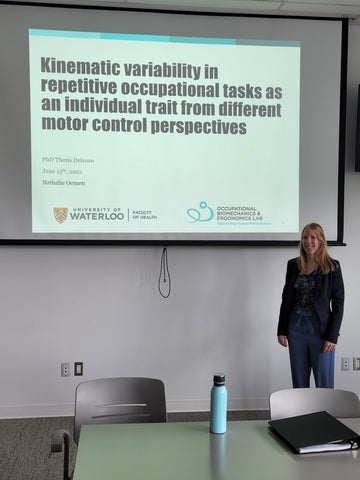A big congratulations goes out to Dr. Nathalie Oomen for successfully defending her PhD dissertation titled: "Kinematic variability in repetitive occupational tasks as an individual trait from different motor control perspectives". Dr. Oomen joined the Occupational Biomechanics and Ergonomics Lab (OBEL) in September 2015 after completing a Master's degree at Vrije Universiteit (VU) in Amsterdam. Nathalie's work was co-supervised by OBEL director Dr. Steven Fischer and the University Research Chair in Biomechanics and Data Science for Human Health and Performance at the University of Ottawa, Dr. Ryan Graham.
Nathalie's work targeted the "Repeaters / Replacers" hypothesis and the variability-fatigue hypothesis that have emerged in the musculoskeletal disorders (MSD) prevention research. In Dr. Oomen's first study, she explored the role of task constraints on motor variability during repetitive lifting. Dr. Oomen demonstrated that participants tend to exhibit consistency in their movement variability independent of task constraints. These findings provide support for the repeaters / replacers hypothesis that suggests that some movers demonstrate consistently low variability - a repeater, where others consistently demonstrate high variability - a replacer. Dr. Oomen has published these findings in Applied Ergonomics.
In studies 2 and 3, Dr. Oomen aimed to understand if different measures of variability provide similar or unique insights regarding movement variability and to extend the findings from study 1, if individuals demonstrate consistent movement variability between different tasks. Dr. Oomen demonstrated that a linear measure of variability (the mean of the standard deviation in the point-by-point joint angle waveforms) generated similar findings to a non-linear measure rooted in dynamical systems theory, the continuous relative phase, but less similar to an alternative non-linear measure, task-irrelevant variability in the uncontrolled manifold consistent with optimal feedback control. When considering the role of task on variability, Dr. Oomen demonstrated that participants did not exhibit strong consistency in their trial-to-trial movement variability, which may provide important context for understanding the limits of the repeater-replacer hypothesis.
In the final study, Dr. Oomen test the variability-fatigue hypothesis positing that those who exhibit higher trial-to-trial variability will demonstrate less accumulation of fatigue relative to those that demonstrate lower trial-to-trial variability. Findings from Dr. Oomen's work did not support the variability-fatigue hypothesis, at least specific to the complex task of repetitive lifting.
Dr. Oomen is continuing to finalizing manuscripts to report on the remaining studies related to her novel and impactful research targeting movement variability and MSD prevention. Stay tuned!
